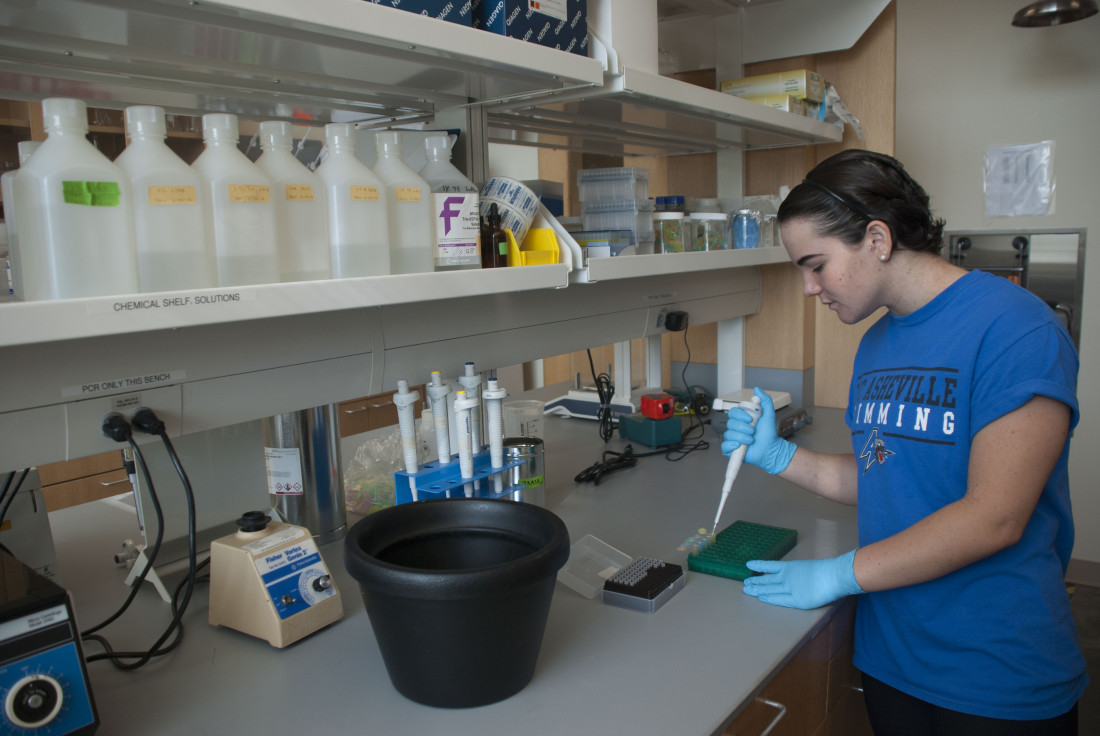Press release from UNC Asheville:
Professors and student researchers from Appalachian State University’s and UNC Asheville’s Departments of Biology have partnered in a federally funded project to assess several aspects of an imperiled plant in western parts of North Carolina and Virginia.
The plant, called Spiraea virginiana, has been on the federal government’s list of threatened species since 1990. It dwells solely in white-water, high-gradient streams in drainage from the Tennessee, Cumberland and New Rivers. The streams are in North Carolina and Virginia.
The project – funded with a U.S. Fish and Wildlife Service (USFWS) grant of $30,194 – is called “Assessing Genetic Diversity, Polyploidy, Reproductive Effort, and Fitness within Spiraea virginiana Populations.” It includes biology professors and students from both Appalachian and UNC Asheville. Between now and September of 2017, they will collect plants and grow them under common conditions to measure their responses and assess local adaption. They’ll also perform breeding trials between isolated populations and assess fertility.
The researchers’ work will build on an earlier federally funded effort that examined Spiraea virginiana around the Cheoah River in North Carolina; among other things, this examined the effects of such factors as mowing and beaver browsing on the plants.
The current project spans a grant period that began this past September. It has several aims. One is to determine whether the plant is doing well enough to be taken off the list of threatened species or whether it should remain on it, said the project’s leader, Dr. Jennifer Rhode Ward, an associate professor of biology at UNC Asheville.
Researchers will be “identifying genetic and environmental factors that might limit (the) species’ success,” Ward said. “Along with giving invaluable research experiences to our students, the data we collect could allow the federal government to work towards de-listing Virginia spiraea, letting the USFWS focus efforts on other plants of conservation concern.”
Another project aim is to gain an understanding of the genetic structure of what project participant Dr. Zack Murrell called “a green fish,” due to its strong preference for habitats along river margins and banks. Murrell is both a professor of biology, a curator and the interim chair of the Department of Biology at Appalachian.
“Given the small number of known locations for the species, we need to determine how genetically diverse the populations are and make an assessment of how to protect this species over time,” Murrell said. “Additionally, the distribution of this species along waterways in the southeast gives us an opportunity to help understand how plants may have migrated in the past and this information can, in turn, help us understand how it may be able to survive during future climate changes.”
“Assessing Genetic Diversity, Polyploidy, Reproductive Effort, and Fitness within Spiraea virginiana Populations” includes three other people from Appalachian’s Department of Biology, in addition to Murrell. One is Dr. Matt C. Estep, an assistant professor. UNC Asheville Professor of Biology David Clarke and Associate Professor of Biology Jonathan Horton also work on the grant-funded project, along with three undergraduate researchers at UNC Asheville, one of whom started on the project this fall.
The primary researchers from Appalachian are both undergraduate students majoring in biology disciplines. They include Logan Clark of Woodland and James Wise of Boone.
Clark is majoring in Ecology, Evolution and Environmental Biology and will graduate in May 2017 with University and Departmental Honors. His thesis research has focused on assessing the genetic diversity of this imperiled species.
Wise will complete his Cell and Molecular Biology degree with Departmental Honors and a double major in Secondary Science Education in May 2018. His thesis research has focused on pollen viability assays and cytological studies to identify genetic barriers to reproduction in Virginia’s Spiraea.
Katie Brown, also one of the project’s student researchers, is a sophomore biology major at UNC Asheville and also a member of the women’s swim team.
For more information, contact UNC Asheville Associate Professor of Biology Jennifer Rhode Ward at 828.251.6232 or jrward@unca.edu.




Before you comment
The comments section is here to provide a platform for civil dialogue on the issues we face together as a local community. Xpress is committed to offering this platform for all voices, but when the tone of the discussion gets nasty or strays off topic, we believe many people choose not to participate. Xpress editors are determined to moderate comments to ensure a constructive interchange is maintained. All comments judged not to be in keeping with the spirit of civil discourse will be removed and repeat violators will be banned. See here for our terms of service. Thank you for being part of this effort to promote respectful discussion.